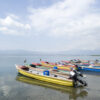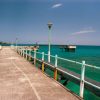Whether a work permit is required depends on the nature of a visitor’s activities to be conducted in Jamaica and the duration of their stay. Crew and cast members who will be in Jamaica for more than six (6) months and are foreign nationals must apply for a work permit, whereas those who will be working in Jamaica for six (6) months or less may apply for an exemption.
For more detailed information the necessary film permits, including fees and documentation requirements, visit the Ministry of Labour and Social Security’s website.
Under normal circumstances, persons travelling to Jamaica must present a passport that is valid for at least six months beyond their date of arrival, as evidence of their identity and nationality. The passport must be issued by a recognised government authority, have a photograph of the holder and provide the holder with a re-entry authority to the country of issue or an entry authority to another country. Some passport holders require a visa to enter Jamaica. For more detailed information about visas, including fees and documentation requirements, visit the PICA website.
When working on your production in Jamaica there are various parts of the filmmaking process for which you may need a permit or license. If you are using animals, lethal weapons, explosives and pyrotechnics, drones or plan to use underwater or aerial photography in your production you will need to obtain a permit. The ‘Guide to Filming in Jamaica’ outlines in more detailed information the specific procedure and authorities where these may be obtained. The Guide is available as a downloadable pdf on this website by checking the menu. JAMPRO also provides services assisting in this process. For other information from the appropriate state agencies and bodies you may consult the following websites and contact persons:
If you are using animals in your production, you must take every precaution to protect and treat them humanely. The Veterinary Services Division requires a very high standard of care, safety and protection of animals used in productions. This is regardless of whether the animal is being used in the film or behind the scenes. To ensure the health and safety of animal actors or animals used behind the scenes we recommend that a veterinarian or representative from Jamaica Society for the Prevention of Cruelty to Animals (JSPCA) is present whenever animals are present during production. You will also need to ensure that authorized animal handlers are able to access the animals at all times.
As a part of the care arranged for the animal, transportation should be arranged in a safe and comfortable manner and well-shaded rest areas made available for the animal to use during their scheduled breaks. Productions must also endeavour to provide adequate food and clean water to keep the animal in good condition during working hours.
Here are some important precautions which must not be violated to ensure safe and healthy animals:
- No animal should be forced to perform any dangerous stunt that could cause death or injury
- No animal should be killed, injured, or treated inhumanely for the sake of a film production or to elicit a performance.
- Although permitted for essential veterinary care, general anaesthesia and sedation are high-risk procedures and should not be administered for the sole purpose of filmmaking.
To book an animal handler and to apply for animal handling permits you can get in contact with the following agencies.
Veterinary Services Division
vsdpermits@gmail.com
vsdpermits@mica.gov.jm
Jamaica Society for the Prevention of Cruelty to Animals
jspca@yahoo.com
http://www.jspca.net
If you do need to import animals to work in your production, it is legally required for the animal to undergo a period of at least 14 days of quarantine before a license. Remember to make an appointment with the Veterinary Services Division at least 3 weeks before the animal arrives in the country.
Firearms and related supplies, other lethal weapons, explosives and pyrotechnics are not permitted in Jamaica, under any circumstances, without the officially documented authorisation of the Ministry of National Security. In the case of genuine arms and ammunition, a license or exemption is necessary for their use to be legal. A permit is required for other restricted items. You may be required to hire the services of an armourer in specific cases where genuine arms and ammunition are utilized on set. Your local Production Manager and the Film Commission can provide references for qualified armourers on the island. Restricted items include, but are not limited to the following:
- Ammunition
- Bullet-proof vests
- Camouflage
- Guns and accessories (real or imitation)
- Firecrackers and flares
- Mace/Pepper spray
- Stun guns/Tasers
If your production requires the importation of genuine/modified/imitation arms and/or ammunition, you must:
- Notify the Jamaica Film Commission of your intention to apply for an approval for importation of a restricted item.
- Complete a Restricted Items Importation/Clearance Form.
The Film Commission can prepare a letter of endorsement, in relation to your production, making reference to the date, time frame of use and specific items to be imported. The letter and the form can then be submitted by your Production Manager to the Ministry of National Security along with supporting documentation which you will be asked to provide. The application processing time is at least ten (10) business days.
Professional operators of unmanned aerial vehicles (UAVs) must apply to the Jamaica Civil Aviation Authority (JCAA) for permits and comply with all conditions included in permits granted, in order to exercise authority to operate UAVs. Depending on the radio frequency a UAV carries, a class license for operation in that frequency (issued by the Spectrum Management Authority) may also be necessary.
Jamaica Civil Aviation Authority
For a UAV Flight Permit to be prepared and issued by the JCAA, once you have settled on the date(s) to conduct your drone operations, you will need to submit a written request that includes the following information:
- Name and mailing address of the accountable person to be named in the permit
- Type of UAV
- Max UAV altitude being requesting (not above 400 feet)
- Location of the UAV operation
- Date and duration of the UAV operation
- Purpose of the UAV operation
The application should be addressed to:
Director General
Jamaica Civil Aviation Authority
4 Winchester Road
Kingston 10
The application process is normally completed within four (4) working days. You will be given special operating instructions, if the location is in or near special use airspace (“restricted”/”prohibited”).
For further enquiries, please contact the JCAA at:
Tel: 876-960-3948 or 876-960-3965
Email: info@jcaa.gov.jm
You may also visit JCAA’s website for alternative contact details.
Currently drones are only allowed to operate in the 2.4GHz and the 5725-5850 MHz frequency bands. Once a drone is operating outside of those bands, spectrum license. The Spectrum Management Authority is the national regulator for the radio frequency spectrum and as such are the agency responsible for issuing a spectrum license. To get in contact with the SMA here please visit their website.
Spectrum Management Authority
www.sma.gov.jm
If your production requires filming at a historic, heritage or otherwise protected cultural site, you may need permission from the Jamaica National Heritage Trust and/or the Ministry with responsibility for Culture and Cultural Heritage. There are some heritage sites where filming is strictly prohibited. Consult with your local Production Manager or the Film Commission to verify your obligations. For additional specific information about historic and heritage sites, visit the Jamaica National Heritage Trust website.
Your primary points of contact for requesting and accessing permits and assistance for temporary road closures, diversion of automobile traffic and/or diversion of pedestrian traffic, will be the relevant parish council and the local precinct of the Jamaica Constabulary Force (JCF). To engage the police for private security purposes, you will need to contact the local precinct of the JCF only. For other forms of police participation, direct approval would need to be granted by the Commissioner of Police.
Your Production Manager should contact the relevant parish council no less than ten (10) business days prior to the scheduled shoot date, to ensure timely processing. Requests must be submitted in writing and should include:
- Your letter of endorsement from the Film Commission.
- The shoot schedule, complete with dates, times and locations for filming.
- The intended use(s) of the designated space(s) and details of road closures and/or any temporary structures that will be erected.
- Notice of any production vehicles that will be parked on public roads,as encroachment fees may apply.
- Name, phone number and email address of the primary applicant.
The specific permits you will require from the parish council, and relevant fees to be paid, will be assessed based on their review of your application. The average processing time is ten (10) business days, provided all relevant information has been submitted. If approved, parish council permits are issued only when the fees are paid in full.
In cases where the police permit for the use of a space for which parish council permit fees have been paid is refused, applicants may bring the letter of refusal and council receipt to the local parish council office for a refund (less a 500 JMD administrative fee), provided that the application to the police was submitted at least ten (10) working days working days prior to the intended date of use.
For additional information about liaising with local parish councils and police for film production purposes, you may contact the Revenue Department of the Kingston and St. Andrew Municipal Corporation at 876-922-4320 or 876-948- 5119.
Application by written request is also required for the issuance of police permits. If special support is mandated, or otherwise desired in particular situations, the police may be engaged in accordance with the Police Private Service Policy, for which set hourly rates have been established.
For requests regarding traffic control and/or private security, applications should be submitted to the Commanding Officer for the area where filming will take place, at least ten (10) business days prior to the scheduled shoot date.
Applicants are advised of the relevant fees after their request and the production requirements have been assessed by the Commanding Officer. For the engagement of police in activities other than traffic control and private security, applications must be submitted directly to the Commissioner of Police at least three (3) weeks prior to the proposed shoot date, either in hard copy or by email. Submit hard copy applications to the Office of the Commissioner of Police, located at 101-105 Old Hope Road, Kingston 6. Submit email applications to cpsecretariat@jcf.gov.jm.
Remember, the content of applications for police permits for activities related to film production should always include:
- Your letter of endorsement from the Film Commission.
- A brief/synopsis of the film.
- Specific and adequate details on the nature of the use of space and, if any, of the support being requested.
- The schedule for the use of space and, if any, for the support being requested.
For additional information, contact the Jamaica Constabulary Force directly at 876-927-4312/3 or 876-754-0558, or speak with your Production Manager.
The National Environment and Planning Agency (NEPA) administers oversight of all activities that have potential or existing implications on Jamaica’s natural environment. You may need to apply for special permits from NEPA, if your production involves:
- Filming in protected areas.
- Filming underwater.
- Importation of flora, fauna, biological organisms or genetically modified organisms.
Speak with your local Production Manager or the Film Commission to determine if your production requires you to have special permits from NEPA. Information regarding environment-related policies, guidelines and fees are available on NEPA’s website.






